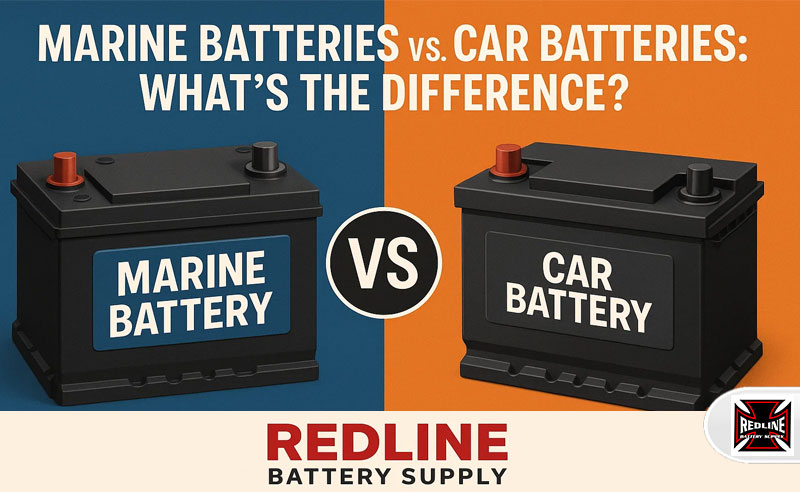
Marine Batteries and car batteries might appear alike at first glance, but they serve very different purposes. While both are built to power engines, their internal structure, performance capabilities, and design are uniquely suited to their specific environments. Knowing these distinctions can help you select the right battery—ensuring dependable performance whether you’re cruising on the water or driving on the open road.
1. Designed for Different Environments
The first major difference lies in how these batteries are built. Car batteries are designed for short bursts of high power to start an engine, after which the vehicle’s alternator takes over. In contrast, marine batteries are built to handle harsh conditions like humidity, vibrations, and salt exposure. They provide steady power for extended periods—perfect for running lights, radios, GPS units, and trolling motors aboard boats.
2. Construction and Durability
Marine batteries are heavier and more rugged than car batteries because they have thicker internal plates and sturdier casings. This design allows them to resist damage from constant movement and water exposure. A car battery, on the other hand, is optimized for stable, land-based conditions and doesn’t need the same level of vibration resistance. If you tried to use a car battery on a boat, it would likely wear out much faster due to the tough marine environment.
3. Power Output and Function
Car batteries deliver a quick, high-powered burst of energy to crank the engine. They are classified as starting batteries. Marine batteries, however, can function as either starting batteries, deep-cycle batteries, or dual-purpose batteries. Deep-cycle marine batteries provide continuous power over long periods, which is ideal for running boat electronics. Dual-purpose marine batteries combine the best of both worlds—offering strong starting power and long-term energy delivery.
4. Maintenance and Longevity
Because marine batteries are designed for endurance, they often require more attention to maintenance. Regular checks on water levels, terminals, and charge status can help maximize their lifespan. Car batteries typically last 3–5 years, while high-quality marine batteries can last even longer if properly cared for.
5. Choosing the Right Battery in Melbourne, Florida
If you’re based in Melbourne, Florida, you know how important reliable power is—whether for weekend boating adventures or daily driving. Choosing the right battery can save you time, money, and frustration in the long run.
At Redline Battery Supply, we specialize in marine batteries and automotive power solutions built for Florida’s coastal conditions. Our experts can help you find the perfect fit for your vehicle or vessel. Visit redlinebatterysupply.com or call 321-327-8995 today to get expert advice and top-quality batteries that keep your engines running strong, both on land and at sea.
More News